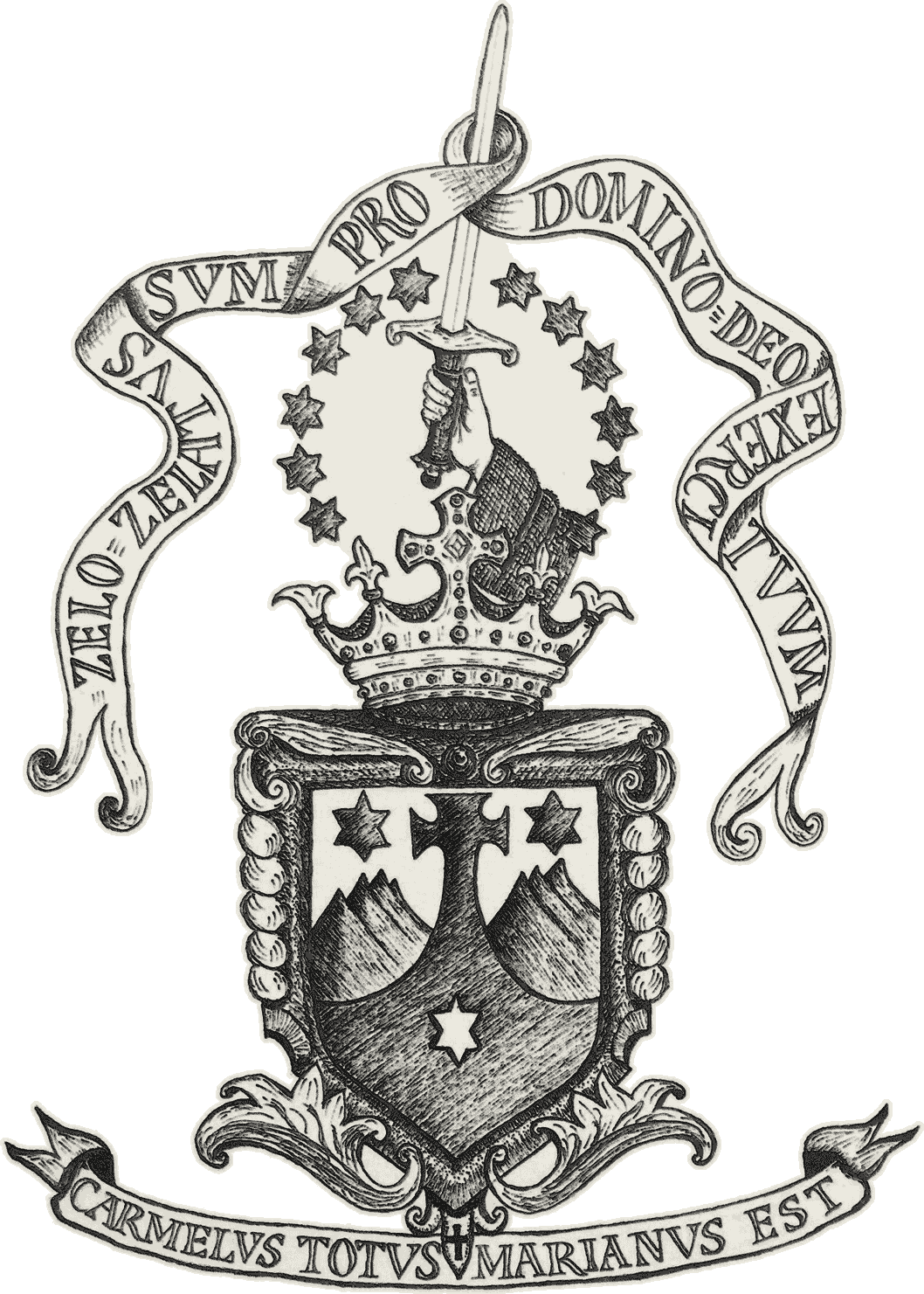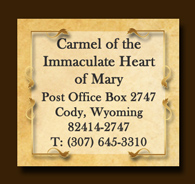Contact the Carmelite Vocations Director Here
The formation of a cloistered Carmelite monk needs to be very balanced, instilling a strong foundation on which the Holy Ghost can build a beautiful spiritual edifice. Therefore the formation must form the whole man, both naturally through human formation and spiritually through classes and one-on-one spiritual formation with a spiritual father. It is a very big decision to make vows in a cloistered community. Therefore it takes many years of learning, prayer and spiritual direction until the young monk can decisively vow himself to God. The journey is well worth the effort as God and the Blessed Mother are never outdone in generosity, and take very seriously the task of building a spiritual castle in the heart of each Carmelite.
Preliminary Discernment
Once a young man has read through our website, he is encouraged to contact the Vocations Director. After a series of phone calls where the Vocations Director and the inquirer speak, and the desires in the heart of the young man can be expressed, the Vocations Director will send the candidate the initial questionnaire. The community Chapter of older monks will read his questionaire responses and prayerfully discern whether God might have given him the grace for this contemplative life. If the monastic Chapter believes that God might be calling the young man to our hidden life, he is invited to a Discernment Retreat at the monastery in Wyoming. During his retreat, he attends Mass with the monks, listens to sermons about the Carmelite life and meets one-on-one with Fr. Prior and other priests who can help foster his call. The retreat takes place with several other young men who are discerning a vocation, so that he can experience some community life while having much silence and solitude for prayer and reflection. If at the end of the retreat the applicant is even more convinced of his calling and wishes to take the next step, and the Chapter monks validate his discernment, then the candidate returns home with an application to enter the community. After all his paperwork is completed and reviewed by the Chapter monks, a date will be set for him to come to the monastery for a three week observership.
Observership / Postulancy
A candidate upon arrival at the monastery will live in the guest house outside the enclosure. He will pray, attend mass and work with the monks so that he can get to know the community in a deeper way.
After one week, the oberver can freely request to enter the monastery to live in the enclosure. There he will observe the community first hand for a period of time determined by Fr. Prior.
After this observership inside the enclosure, when Fr. Prior and the Postulant Master are convinced that he has the grace to live this life and the candidate desires to continue, the candidate is clothed in the brown robes of a postulant. This includes the postulant scapular, which is larger than the common small scapular.
He is now considered a brother of the community. During this period of postulancy that will last for a maximum of one year, the postulant is trained in the charism of the Carmelite monks through classes and daily one-on-one spiritual direction. He is also given balanced human formation for the rewarding life of chastity through encouraging friendships, physical exercize and formation in a chaste love for the Blessed Virgin. Postulancy provides the young man with an opportunity to deepen his understanding of the Carmelite way of life and to bond with his spiritual fathers and brothers in the fraternal life.
Novitiate
After the year of postulancy is completed, the candidate is clothed as a novice in the full brown wool habit of our Order and receives his new name and title in religion (example: Br. Thomas of Jesus), thus beginning his two years of novitiate. During the novitiate, the novice is trained and tested in living the evangelical counsels of Obedience, Chastity and Poverty. The new novice is trained one-on-one in our Carmelite obedience and in particular filial union, which aids his spirituality and growth in the life of humble, joyful virtue. He studies in depth the Carmelite Rule, the Constitutions of the Monks of the Most Blessed Virgin Mary of Mount Carmel, and the depth of Carmelite spirituality found in the writings of the Carmelite Doctors and Saints. The two year novitiate provides the novice with an opportunity to mature in his monastic vocation as a Carmelite and to embrace the fullness of the tradition, spirituality, and manner of living proper to our cloistered community.
Temporarily Professed
If a novice remains firm in the conviction of his calling and the Novice Master confirms that he has the requisite virtue to make his temporary vows, the novice freely requests to make his temporary vows of obedience, chastity, and poverty for three years. He makes his vows in the hands of Fr. Prior, and thereby through Our Lady of Mt Carmel to each person of the Most Holy Trinity. This is the point of graduating from the novitiate and the care of his soul is now given to Fr. Prior who, with fatherly care, helps him through his first tender years in vows. The temporary professed replaces the short scapular of a novice with the long scapular of a professed religious of Mount Carmel. Over the next three years the temporary professed is further purified and tested in the vows and virtues required therein. Through his faithfully living of his vows, he sinks his roots deeper into the well springs of Carmel, planted by the spring of St. Elias, our Holy Father. This is a time when the religious is further confirmed in his vocation and begins to live the fullness of the religious life through his vows. He slowly assumes more responsibility within the community and this further refines his virtue and strengthens his manly character.

Perpetually Professed
After a total of six years and by the grace of God and the prayers of the brothers, the monk makes the final step of professing the vows "usque ad mortem"(until death), confirming him completely in the service of God and the Church. Perpetual profession allows the monk to make a complete gift of himself to our Lord Jesus Christ through His Blessed Mother in the living of the Holy Vows of obedience, chastity, and poverty until the Lord shall summon him from this life to the beatitude of heaven. St. Therese of the Child Jesus spoke of her vows as her weapons whereby she could merit grace for souls greatly in need of Christ. Now the monk lives the fullness of everything he has worked for since his initial contact with the Carmelite Monks. His final vows are the means that Our Lady uses to ripen his spirituality and prepare him for the fulfillment of his entire life of grace. He is now a hidden leaven and love within the heart of the Church.


